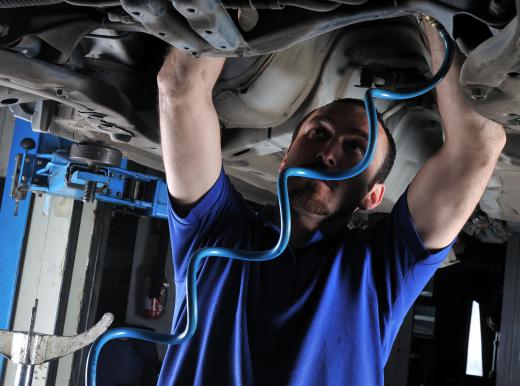A ratchet wrench, also known as a socket wrench, is a hand tool used to loosen and tighten fastening hardware. Tightening hardware includes the nuts and bolts that secure the ends of screws in buildings, furniture, and some electronic objects. The body of a ratchet wrench is usually metal and consists of a long, thin ratchet handle and a small hollow socket attachment. Sockets are modifying pieces of hardware of various sizes that are designed to adapt the wrench for tightening fastening hardware. A ratchet wrench is so named because it uses a ratcheting motion to tighten and loosen fastening hardware. This tool is used when building or repairing many types of objects, including automobile repair and building construction.
Used to modify the wrench to fit different sized fastening hardware, a socket locks into the ratchet by fitting a square-shaped part of the socket into a square shaped hole in the wrench handle. The socket is held into the square shaped hole, called the drive, using a mechanism called a ball detent or ball stopper, which uses a spring-loaded ball to lock the socket into the drive. The size of the drive hole in the ratchet wrench handle determines the size of the sockets that it holds. Ratchet wrench handles and sockets must match in drive size to be used together.

Ratchet wrench sets are a basic tool included in most home workshop and emergency automobile repair toolkits. A ratcheting mechanism works by using a circular toothed wheel that allows the tightening mechanism to move in only one direction. When the handle is moved in the other direction, the socket does not move. This has the effect of letting the user move the ratcheting handle back and forth to turn the socket. As the ratchet rotates, it will generally make a rapid clicking sound similar to the sound made when playing the teeth of a comb.
This means of hardware tightening is in contrast with the technique used with a non-ratcheting wrench, which requires the user to repeatedly twist or rotate the wrench to loosen or tightening the fastening hardware. Ratcheting can often prove more effective in tightening nuts and bolts in hard-to-reach places and loosening difficult-to-remove fastening hardware. In confined areas in which the ratchet and its socket are difficult to fit, hardware that adapts the length of the ratchet or socket hole can help fit the tool into difficult-to-reach locations to tighten hardware that would be inaccessible to a non-ratcheting wrench.
